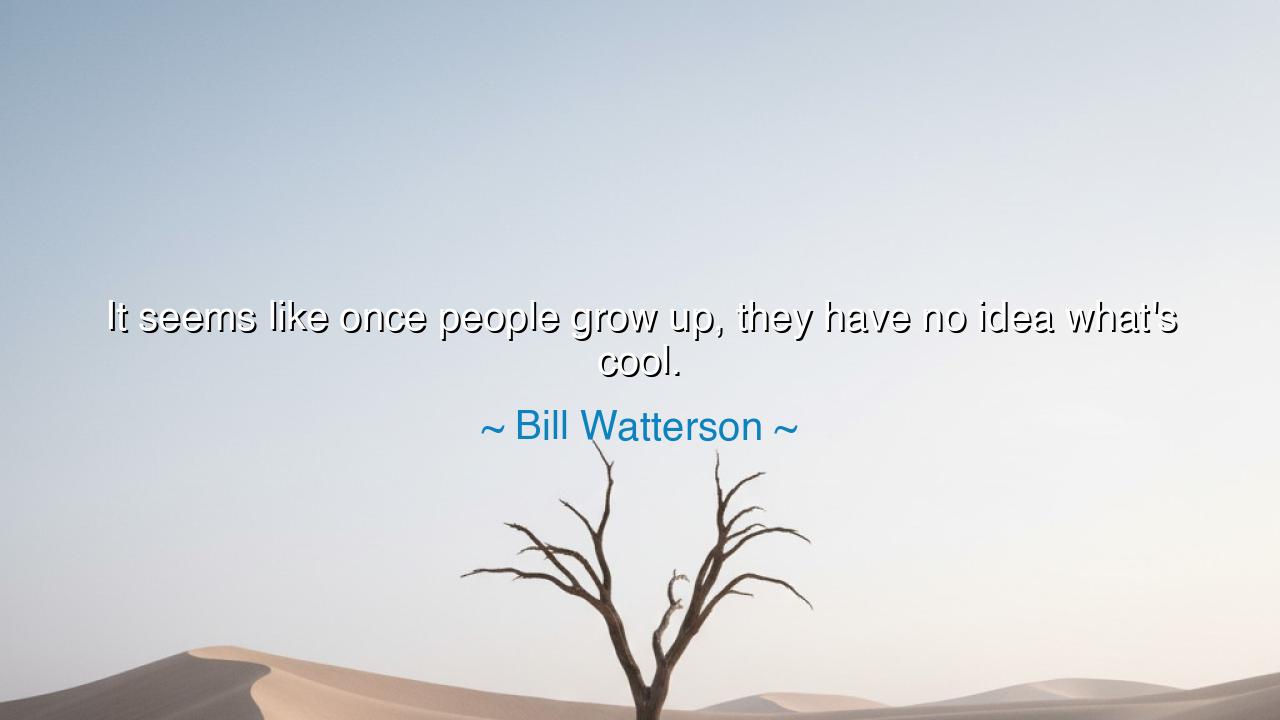
It seems like once people grow up, they have no idea what's cool.






"It seems like once people grow up, they have no idea what's cool." These words, spoken by the brilliant Bill Watterson, carry within them a deep and somewhat melancholic truth about the nature of adulthood, conformity, and the fading of spontaneity that often accompanies growing older. Watterson, through his beloved character Calvin, speaks to the loss of authenticity and the tendency of society to impose a rigid framework on what it means to be "cool." The child’s vision, wild and free, is often slowly shaped and confined by the constraints of adult expectations, leaving behind the ability to see the world with the wonder and joy that is the birthright of youth. This, Watterson suggests, is the great tragedy of maturity: as we grow older, we lose touch with what truly makes life vibrant and alive.
In the ancient world, the transition from youth to adulthood was a solemn one. The Greeks, in their wisdom, knew that the spirit of youth was something to be cherished and protected. In their mythology, the gods often embodied the qualities of both youth and wisdom, understanding that the ideal balance was the harmonious blending of the spontaneity of youth with the wisdom of age. Yet, there was a recognition that too often, the joy and wonder of the young were crushed under the weight of adult responsibility. This is evident in the tale of Phaethon, the son of Helios, who, in his youthful pride and desire to prove himself, lost control of the sun chariot and fell to his death. His fall was symbolic of how the idealism of youth, when unchecked or unsupported by wisdom, could lead to catastrophe. Yet, Phaethon’s story also served as a reminder that youth, in its raw energy and freedom, must be tempered by the guidance of the older generations, lest it burn too brightly and fizzle out too soon.
But there is another aspect to this wisdom, which Bill Watterson captures so poignantly in his words. What is cool is not a standard set by age or status—it is a state of being, a way of living that resonates with the authenticity of the soul. The true "coolness" of youth is not defined by trends, nor by the approval of society. Rather, it is rooted in expressiveness, creativity, and the willingness to live boldly, without fear of judgment. Just as the great philosophers of ancient Greece, like Socrates, dared to ask uncomfortable questions and to live outside the norms of their society, so too did the great artists and innovators who were seen as "cool" not because they followed others, but because they followed their own hearts.
Consider the example of Leonardo da Vinci, whose brilliance was not confined to the accepted norms of his time. He was not just a painter but an inventor, a dreamer, and an artist who lived in a way that was not concerned with the approval of others. Da Vinci was the embodiment of a coolness that was grounded in curiosity, imagination, and the boldness to explore the unknown. To him, coolness was about the freedom to pursue his passions, regardless of whether society understood or approved of them. In the Renaissance, he and his peers were not merely adhering to the standards of their era—they were reshaping what it meant to be human, changing the way people saw the world. His “coolness” lay in his unwavering commitment to creativity, a quality that too often fades as people grow older and more constricted by societal norms.
This transition from youthful vitality to adult restraint is a natural part of life, yet it is also one that requires reflection. Watterson’s quote calls us to remember what it is to be free, to embrace the whimsy, the imagination, and the joy of living authentically. As we age, we should not lose the sense of wonder that makes life rich. The world is vast, and coolness is found not in chasing after what others deem acceptable, but in remaining true to ourselves, in expressing our unique creativity, and in living with unbridled enthusiasm.
In the ancient teachings, there was often a celebration of living with purpose while also embracing the spontaneity of life. Think of the Buddha, who in his enlightenment, taught that the path to peace lay not in following the rigid dictates of society, but in living with mindfulness and authenticity. Similarly, Confucius sought to remind people that true greatness lay in the pursuit of virtue, in living with integrity, and in staying true to one’s own inner nature. These teachings suggest that coolness is not something dictated by age, but by the alignment of our inner truth with our actions in the world. To grow older is not to become less cool, but to understand that the truest form of "coolness" is to live without fear of judgment, to remain connected to the joy and creativity that comes with truly being yourself.
The lesson here, dear listener, is one of reflection and intentional living. As you age, do not let the pressures of society, of tradition, or of the expectations of others strip away the vitality that once made you feel alive. Embrace your inner child, the one that was full of wonder, imagination, and freedom. Whether you are young or old, remember that coolness does not come from conformity but from the authentic expression of who you truly are. In this way, you will not lose your coolness as you grow older, but rather, you will find it again in the deep, joyful expression of your soul.






AAdministratorAdministrator
Welcome, honored guests. Please leave a comment, we will respond soon